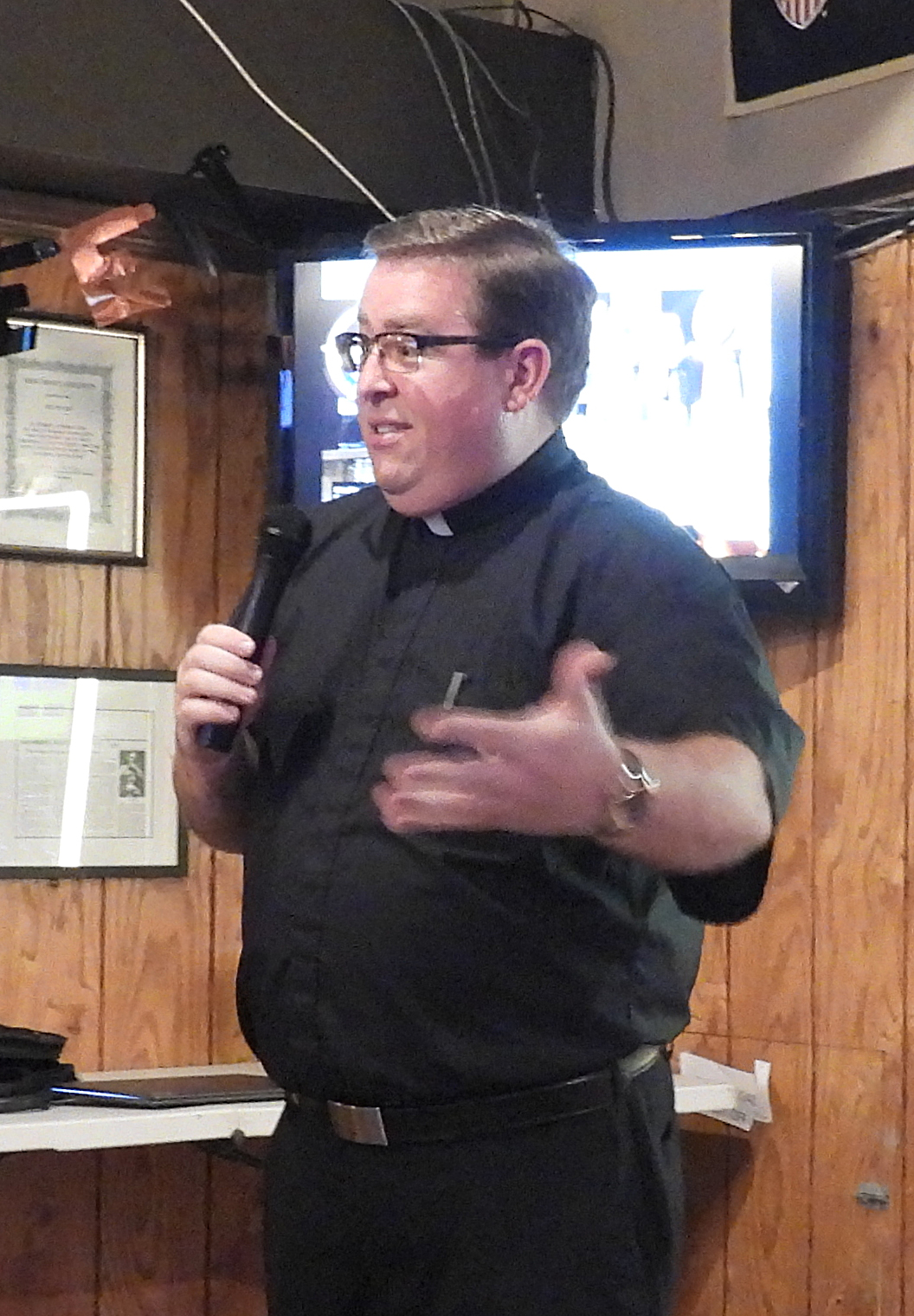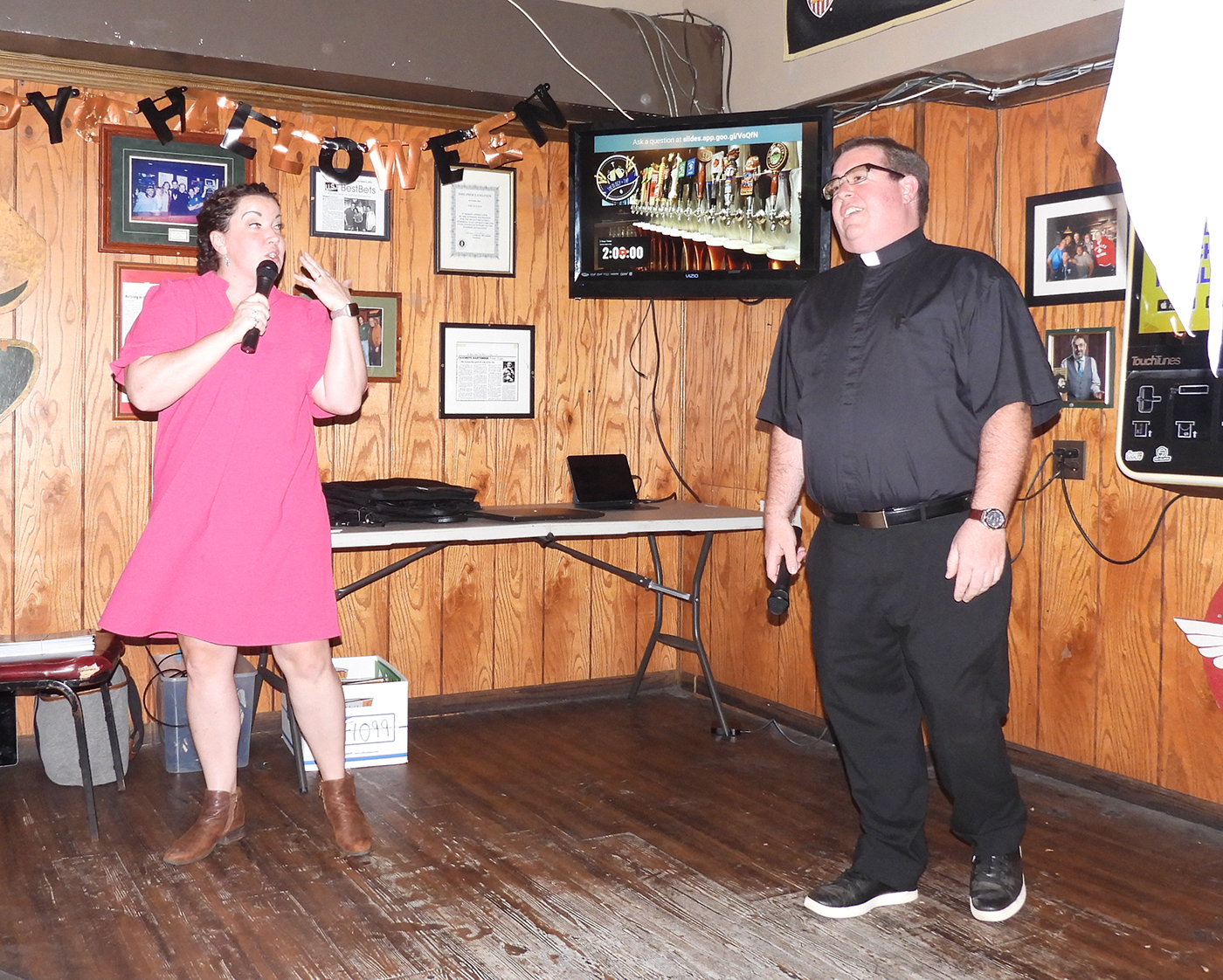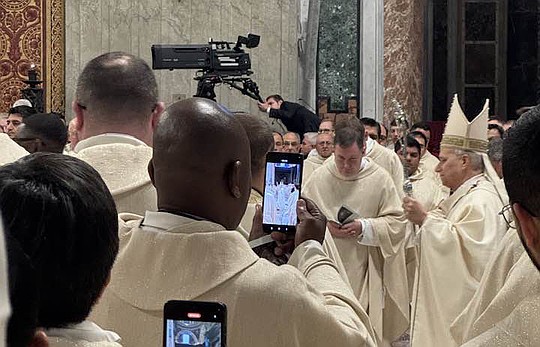Young adults learn what it means to be a Catholic voter at Princeton TOT event
October 28, 2024 at 11:47 a.m.

As the 2024 presidential election neared, young adults gathered in Princeton’s Ivy Inn Oct. 23 for a Theology on Tap event focused on forming their Catholic consciences before voting.
The presentation, co-sponsored by the diocesan Department of Youth and Young Adult Ministries and St. Paul Parish, was led by Father Christopher Colavito, who reflected on his personal background in politics before he was ordained a priest for the Diocese and spanned several points of political interest to the Catholic voter – including the overarching goal of faithful citizenship.
“In the end, it’s not about winning elections; it’s about salvation of souls,” Father Colavito stressed.
“We as Catholics have to address everything in our life as disciples of Christ,” he said. “First and foremost, we are made in the image and likeness of God … if that’s not the first perspective that we handle ... we’re going to let the politics, our ideology, color ourselves or our faith – and that, my friends, is where the problem is.”
As chaplain for The College of New Jersey, Ewing, and Lawrenceville’s Notre Dame High School, as well as diocesan vocations director, Father Colavito’s focus on spiritual formation lent itself to discussing how a well-formed conscience and knowledge of the Catholic faith are essential for making decisions in the voting booth.
“We have to know our faith in its broadest perspective,” he said. “Not just the hot button issues, those things that interest you. But our faith, through its deepest theological understanding, to the specific issues. Otherwise, you cannot make informed decisions … if you don’t know the faith, you can’t be a Catholic voter.”
Knowing the Faith, Issues
Father Colavito had an early introduction to politics as a teenager, meeting with notable politicians in his family home. He spent several years as a young adult away from his faith and engrossed in local politics before experiencing a reversion and a call to the priesthood. The skills he learned while inspiring people to vote ultimately informed his work with young people and encouraging vocations to the religious life.
The Catholic, Father Colavito noted, must understand “the hierarchy of issues … both universal, and sometimes specific to a country.”

Father Christopher Colavito explains the importance of forming one's conscience correctly in order to vote as a Catholic. EmmaLee Italia photo
The top universal issue for the Church today, he emphasized, is “life in general, and all the issues that go with it … Morals, in fact, are the broadest political issue that we’re going to deal with – but you can’t understand the moral perspective unless you have the big picture perspective and understanding of the Church in which it’s all rooted … and where they apply within the political realm.”
He pointed to a quote from Pope Francis, who said, “we need to participate in the common good.”
“That is what the Church teaches and pronounces universally,” Father Colavito emphasized. “In most political realms, they see things not as the common good but the ‘greater good.’
“My friends, anytime you do something for the ‘greater good,’ someone is suffering, because it’s not universally good – it’s at the cost of somebody.”
He referenced the Scripture passage in which the high priest Caiaphas said [about Jesus], “It is better that one Jew die than the nation suffer under the Roman rule.”
“That is never, ever how we should approach something,” Father Colavito said. “It always needs to be for the common good because it’s for the good of all, at the expense of no one.”
Participation and Formation
Good Catholics, Father Colavito argued, “immerse themselves in politics by offering the best of themselves so that the leader can govern. We should participate … we need to have some kind of governance.”
He quoted the United States Conference of Catholic Bishops, who said that “as Catholics and Americans we are blessed to be able to participate in our nation’s political life; our freedoms respect the dignity of individuals and their consciences and allow us to work together for the common good.”
Father Colavito pointed to the right formation of one’s conscience as integral to voting responsibly.
“A properly formed conscience is the most important thing you need to do by learning and understanding your faith properly … it must be directed and enhanced,” he explained. “It is the voice of God within us, but it must be brought forth. The conscience can never be the excuse of why you did something wrong.”
Politicians, he noted, will often claim that their conscience led them to a particular decision, but “they have a bad conscience, it was not properly formed, or they allowed it to be formed the way they wanted it to be ... do not let that be a copout as a voter or as a politician.”
Father Colavito encouraged those who want to be well informed in their voting to read the 1891 document “Rerum Novarum” – “On New Things” – by Pope Leo XIII.
This document on the rights and duties of capital and labor “is so important to our Catholic faith and understanding of social justice within the world today, there have been five major documents written on its anniversaries,” he said, the most recent in 2001 by St. John Paul II. “[It is] the basis of modern day Catholic social teaching.”
“The Church’s obligation to participate in shaping the moral character of society is a requirement of our faith… we must shape and form society, not the other way around,” he continued. “We don’t let culture shape us.”
Questions from Participants
Those in attendance submitted questions electronically, several of which Father Colavito was able to address with the crowd.
“It’s important to understand our system of government and the difference between the legality of something and the politics of something,” he noted. Answering someone who asked about abstention, Father Colavito said that Catholic citizens “do have the obligation to vote if there is an opportunity” to allow our voices to be heard in the political sphere, even at the state and local levels.
“How should one speak about politics with family and friends who view things differently than we do?” someone posed.
“Lovingly,” he said simply. “If your faith is guiding your politics, that’s what you have to [express] so they understand where you’re coming from politically,” Father Colavito responded. “We’re not evangelizing … by keeping the peace. … We can’t be one of those [who keeps the peace] by keeping our mouths shut.
“The whole purpose is not to ‘win’ the argument, but to help them understand this is good for their salvation – not their happiness or way of life,” he continued. “Out of love, our desire of the good of the other, we have to engage with them, and sometimes through our actions.”

Kait Mayer, director of marketing and communications for Princeton's St. Paul Parish, introduces Father Christopher Colavito at the Oct. 23 Theology on Tap presentation. EmmaLee Italia photo
Related Stories
Thursday, January 08, 2026
E-Editions
Events
As the 2024 presidential election neared, young adults gathered in Princeton’s Ivy Inn Oct. 23 for a Theology on Tap event focused on forming their Catholic consciences before voting.
The presentation, co-sponsored by the diocesan Department of Youth and Young Adult Ministries and St. Paul Parish, was led by Father Christopher Colavito, who reflected on his personal background in politics before he was ordained a priest for the Diocese and spanned several points of political interest to the Catholic voter – including the overarching goal of faithful citizenship.
“In the end, it’s not about winning elections; it’s about salvation of souls,” Father Colavito stressed.
“We as Catholics have to address everything in our life as disciples of Christ,” he said. “First and foremost, we are made in the image and likeness of God … if that’s not the first perspective that we handle ... we’re going to let the politics, our ideology, color ourselves or our faith – and that, my friends, is where the problem is.”
As chaplain for The College of New Jersey, Ewing, and Lawrenceville’s Notre Dame High School, as well as diocesan vocations director, Father Colavito’s focus on spiritual formation lent itself to discussing how a well-formed conscience and knowledge of the Catholic faith are essential for making decisions in the voting booth.
“We have to know our faith in its broadest perspective,” he said. “Not just the hot button issues, those things that interest you. But our faith, through its deepest theological understanding, to the specific issues. Otherwise, you cannot make informed decisions … if you don’t know the faith, you can’t be a Catholic voter.”
Knowing the Faith, Issues
Father Colavito had an early introduction to politics as a teenager, meeting with notable politicians in his family home. He spent several years as a young adult away from his faith and engrossed in local politics before experiencing a reversion and a call to the priesthood. The skills he learned while inspiring people to vote ultimately informed his work with young people and encouraging vocations to the religious life.
The Catholic, Father Colavito noted, must understand “the hierarchy of issues … both universal, and sometimes specific to a country.”

Father Christopher Colavito explains the importance of forming one's conscience correctly in order to vote as a Catholic. EmmaLee Italia photo
The top universal issue for the Church today, he emphasized, is “life in general, and all the issues that go with it … Morals, in fact, are the broadest political issue that we’re going to deal with – but you can’t understand the moral perspective unless you have the big picture perspective and understanding of the Church in which it’s all rooted … and where they apply within the political realm.”
He pointed to a quote from Pope Francis, who said, “we need to participate in the common good.”
“That is what the Church teaches and pronounces universally,” Father Colavito emphasized. “In most political realms, they see things not as the common good but the ‘greater good.’
“My friends, anytime you do something for the ‘greater good,’ someone is suffering, because it’s not universally good – it’s at the cost of somebody.”
He referenced the Scripture passage in which the high priest Caiaphas said [about Jesus], “It is better that one Jew die than the nation suffer under the Roman rule.”
“That is never, ever how we should approach something,” Father Colavito said. “It always needs to be for the common good because it’s for the good of all, at the expense of no one.”
Participation and Formation
Good Catholics, Father Colavito argued, “immerse themselves in politics by offering the best of themselves so that the leader can govern. We should participate … we need to have some kind of governance.”
He quoted the United States Conference of Catholic Bishops, who said that “as Catholics and Americans we are blessed to be able to participate in our nation’s political life; our freedoms respect the dignity of individuals and their consciences and allow us to work together for the common good.”
Father Colavito pointed to the right formation of one’s conscience as integral to voting responsibly.
“A properly formed conscience is the most important thing you need to do by learning and understanding your faith properly … it must be directed and enhanced,” he explained. “It is the voice of God within us, but it must be brought forth. The conscience can never be the excuse of why you did something wrong.”
Politicians, he noted, will often claim that their conscience led them to a particular decision, but “they have a bad conscience, it was not properly formed, or they allowed it to be formed the way they wanted it to be ... do not let that be a copout as a voter or as a politician.”
Father Colavito encouraged those who want to be well informed in their voting to read the 1891 document “Rerum Novarum” – “On New Things” – by Pope Leo XIII.
This document on the rights and duties of capital and labor “is so important to our Catholic faith and understanding of social justice within the world today, there have been five major documents written on its anniversaries,” he said, the most recent in 2001 by St. John Paul II. “[It is] the basis of modern day Catholic social teaching.”
“The Church’s obligation to participate in shaping the moral character of society is a requirement of our faith… we must shape and form society, not the other way around,” he continued. “We don’t let culture shape us.”
Questions from Participants
Those in attendance submitted questions electronically, several of which Father Colavito was able to address with the crowd.
“It’s important to understand our system of government and the difference between the legality of something and the politics of something,” he noted. Answering someone who asked about abstention, Father Colavito said that Catholic citizens “do have the obligation to vote if there is an opportunity” to allow our voices to be heard in the political sphere, even at the state and local levels.
“How should one speak about politics with family and friends who view things differently than we do?” someone posed.
“Lovingly,” he said simply. “If your faith is guiding your politics, that’s what you have to [express] so they understand where you’re coming from politically,” Father Colavito responded. “We’re not evangelizing … by keeping the peace. … We can’t be one of those [who keeps the peace] by keeping our mouths shut.
“The whole purpose is not to ‘win’ the argument, but to help them understand this is good for their salvation – not their happiness or way of life,” he continued. “Out of love, our desire of the good of the other, we have to engage with them, and sometimes through our actions.”

Kait Mayer, director of marketing and communications for Princeton's St. Paul Parish, introduces Father Christopher Colavito at the Oct. 23 Theology on Tap presentation. EmmaLee Italia photo










